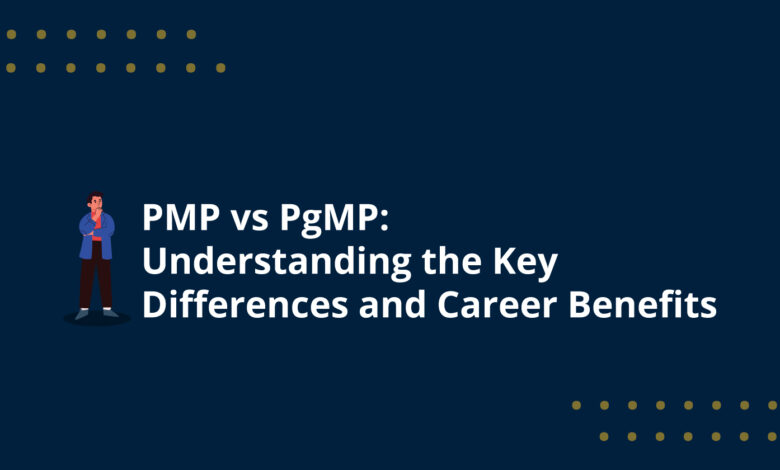
Have you ever thought about the process in which enterprises come out on top in project execution and program management?
Let me start with a surprising fact: By 2030, the global project management industry is expected to grow by 33% or nearly 22 million new jobs will be available around the globe! This means that certifications such as PMP and PgMP are more important now than ever before.
So what’s the difference between these two top certifications? Either you want to focus on managing single projects or implementing multi-project programs, Let’s see which certification fits your professional goals!
What are PMP and PgMP Certifications:
Before we start comparing, let’s understand these certifications at their core:
PMP certification is perhaps the most well-known qualification for Project Managers. It shows your ability to take and manage individual projects, deliver on time, work within the budget, and motivate teams to achieve results. It is like achieving a black belt in project management!

PgMP (Program Management Professional) qualification is advanced and designed for experienced project managers who are prepared to advance to program management. Program managers do not work on just one project but instead, coordinate multiple related projects that are strategic to the company.
To explain: Imagine the Project Management Professional as the winner of a game of chess: A project has certain moves, certain rules, and certain guidelines, and PgMP-certified professionals who participate in events where they manage the competition make sure that each individual game fits into the overall reasoning of the tournament.
Key Differences Between PMP and PgMP:
| Criteria | PMP Certification | PgMP Certification | |
| Focus | This PMP course focuses on the management of projects—, i.e. the execution, monitoring and achievement of specific objectives within defined boundaries. | PgMP Certification Training focuses on the management of programs — groups of related projects working together to achieve broader, strategic objectives. | |
| Eligibility Requirements | Set A: – High school diploma or equivalent – 60 months (5 years) of project management experience within the last 8 years – 35 hours of project management education or training | Set A: – High school diploma or associate degree – 4 years of project management experience OR PMP credential – 7 years of program management experience within the last 15 years | |
| Set B: – Bachelor’s degree or higher (or global equivalent) – 36 months (3 years) of project management experience within the last 8 years – 35 hours of project management education or training | Set B: – 4-year college/university degree – 4 years of project management experience OR PMP designation – 4 years of program management experience within the last 15 years | ||
| Examination Structure | – 180 multiple-choice questions – Exam time: 230 minutes – Covers predictive, agile, and hybrid approaches (approx. 50/50 split) | – 170 multiple-choice questions within 240 minutes – Covers topics such as program strategy, governance, benefits management, stakeholder engagement, program lifecycle, and performance management. | |
| Target Audience | Aspiring Project Managers Project Team Members seeking PMP® Experienced/Senior Project Managers Project Coordinators IT Project Managers Project Leaders Project Analysts Team Leaders Program Managers Product Manager | Experienced Program Managers Project Managers with Program Experience Portfolio Managers Senior Executives and Leaders Consultants and Advisors Project stakeholders Strategic Planners Aspiring Program Managers |
Career Benefits of PMP and PgMP:
Both certifications offer some advantages—here’s how they compare:
Benefits of PMP
- Credibility and Global Recognition: PMP secures your reputation as a project management expert across industries.
- Higher Salary Potential: PMP-certified professionals see a 33% higher salary than their peers, with average salaries reaching $120,000 annually (source: PMI Salary Survey).
- Broader Opportunities: Ideal for breaking into new markets, industries, or roles with individual project focus.
Benefits of PgMP
- Leadership Readiness: PgMP prepares you for senior strategic positions, making you indispensable to executive-level program management.
- Strategic Vision: Demonstrates your ability to align projects for business-wide goals—a must for C-suite leaders.
- Higher Earning Potential: According to PMI, PgMP professionals command significantly higher salaries due to their role’s strategic importance.
Who Should Choose PMP vs PgMP:
Need help deciding? Here are some scenarios:
| Choose PMP if | Choose PgMP if |
| You are a mid-level project manager managing event planning, system upgrades, or product launches. | You are ready to oversee complex initiatives involving multiple projects. For instance, leading a program to launch multiple product lines globally. |
| Want industry-wide recognition for managing successful projects and honing your technical skills. | Aspire to step into senior roles like Program Director or VP of Operations. |
| Aiming for PM roles across industries, like IT, marketing, or engineering. | Have already mastered project management and want to focus on strategic, high-impact leadership. |
Here’s a quick summary to help:
| Certification | Best For | Career Stage | Focus |
| PMP | Mid-level project managers | Tactical implementation | Individual projects |
| PgMP | Senior leaders | Strategic decision-making | Multi-project programs |
Tips for Choosing the Right Certification:
Here are a few tips to help you choose:
- Assess Your Career Goals: Do you see yourself excelling in technical project execution or shaping strategic visions?
- Evaluate Your Experience Level: If you are newer in project management, start with PMP. PgMP is for seasoned professionals.
- Research Industry Demand: Check job boards or reports to see whether employers are prioritizing project or program management expertise in your field.
- Remember the Progression: Think of PMP as the foundation; PgMP is the next step toward program portfolio brilliance.
Finally, keep this in mind that PMP is the perfect stepping stone, while PgMP propels you to a new leadership role!
Preparing for PMP or PgMP Certification Exams:
Getting certified takes preparation. Here’s how to set yourself up for success:
- Start with whatever possible resourcessuch asInvest in study guides, online courses, and practice tests. PMI-approved materials are a great start.
- Create a study plan that PMP may need approx 1-3 months of preparation, while PgMP often requires 6+ months of study and experience reflection.
- Get Practical Experience especially for the PgMP, hands-on program management is mandatory and invaluable.
- Join study groups means engaging with online communities or local PMI chapters for advice and support.
Conclusion:
In conclusion, both certifications PMP and PgMP are a great advantage in order to advance your career in the field of project and program manager.
Considering this, PMP is useful in controlling single projects and getting the attention of the industry’s professional processes, while PgMP sends you towards higher level management functions that are strategic towards the success of the organization.
The right decision depends on the ambition of a career, skills and eligibility criteria. Whichever way, understand that these certifications provide pathways to great opportunities. Take the plunge today and watch your career skyrocket!





